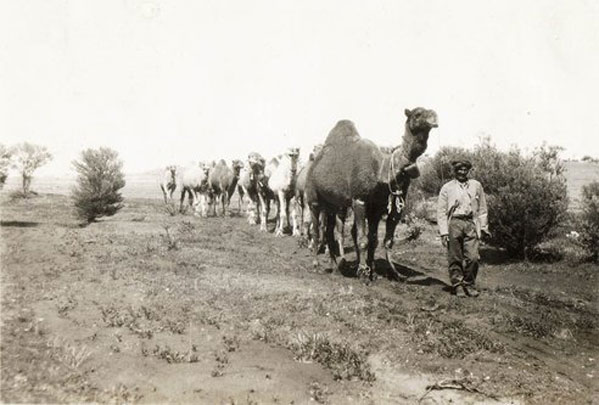

The Egyptians may have cornered the market on pyramids, but it is Australia that remains home to the world’s largest population of wild camels. In Western Australia, these ‘ships of the desert’ roam the outback in herds up to 100-strong and the Australian Camel are reaching plague proportions.
New Eco-Menu Item? “A three-year study has found the population of more than a million feral camels is now out of control and damaging desert ecosystems, water sources, rare plants, and animals. The Recommendation: "Eat Them, It's a Bit Like Beef" Professor Murray McGregor: "Its beautiful meat. It's a bit like beef. It's as lean; it's an excellent health food".
In the 1860s about 10,000 camels were imported into Australia, mostly from Palestine and India. The single-humped dromedary camels were used as draft and riding animals by people pioneering the dry interior. The Afghans famously used the camels in the construction of the “Ghan Railway”. When their work was done and road and rail connected the Australian interior, the animals were just turned loose creating the world's only population of wild camels. Since then their population has doubled every eight or nine years.

Head up to Broome, a resort town in WA’s tropical northwest and you can ride a domesticated camel, and take a sunset ride along the famous white sands of Cable Beach. Whilst camels have now been identified as an environmental threat, they now play a significantly different role in Western Australia. Camels are now firmly in entrenched in the Broome/Cable Beach tourist strategy and each day long caravans carry tourists up and down stretches of Cable Beach and is rapidly becoming a “Must Do” experience while visiting the area.
A possible solution: Saudi Arabians and other Muslim Countries Importing Camels from Australia to meet.

The Central Australian Camel Industry Association recently told the BBC, that the Saudis need to import Australian camels for meat production because the use of their own stock is for breeding and racing purposes only. "The Saudis do not have enough [camels] for their own consumption of meat," Hundreds of thousands of camels are slaughtered every year during the Muslim pilgrimage, or Hajj, in Mecca. The Saudis have traditionally imported camels from North Africa, but a combination of disease, drought, and political instability has led them to look elsewhere. Camel meat is also consumed elsewhere in the Muslim world - a fact not lost on Australian camel-exporters who are looking at is catering to Muslim countries worldwide. The Central Australian Camel Industry Association is now targeting its neighbor Indonesia, the world's most populous Muslim country.
Anyone Fancy a Camel Burger?
Recent Posts
Blog Categories
Blog archives
- March 2025 (1)
- November 2024 (1)
- October 2024 (1)
- September 2024 (8)
- June 2024 (4)
- May 2024 (2)
- April 2024 (2)
- March 2024 (13)
- February 2024 (3)
- January 2024 (5)
- December 2023 (6)
- November 2023 (4)
- October 2023 (11)
- September 2023 (2)
- August 2023 (6)
- July 2023 (2)
- June 2023 (17)
- May 2023 (3)
- April 2023 (5)
- March 2023 (8)
- February 2023 (9)
- January 2023 (12)
- December 2022 (9)
- November 2022 (12)
- October 2022 (12)
- September 2022 (12)
- August 2022 (6)
- July 2022 (9)
- June 2022 (7)
- May 2022 (3)
- April 2022 (4)
- March 2022 (6)
- February 2022 (1)
- January 2022 (4)
- December 2021 (2)
- November 2021 (3)
- October 2021 (1)
- September 2021 (4)
- August 2021 (10)
- July 2021 (13)
- June 2021 (6)
- April 2021 (2)
- March 2021 (2)
- February 2021 (1)
- January 2021 (1)
- December 2020 (2)
- November 2020 (3)
- October 2020 (2)
- September 2020 (1)
- August 2020 (1)
- July 2020 (1)
- June 2020 (1)
- May 2020 (1)
- March 2020 (1)
- February 2020 (2)
- January 2020 (4)
- December 2019 (2)
- November 2019 (1)
- October 2019 (1)
- September 2019 (5)
- August 2019 (1)
- July 2019 (5)
- June 2019 (1)
- May 2019 (1)
- April 2019 (1)
- March 2019 (1)
- February 2019 (1)
- January 2019 (1)
- December 2018 (1)
- October 2018 (1)
- May 2018 (1)
- February 2018 (1)
- December 2017 (1)
- October 2017 (1)
- June 2017 (1)
- May 2017 (1)
- February 2017 (1)
- January 2017 (1)
- September 2016 (1)
- August 2016 (2)
- July 2016 (1)
- June 2016 (1)
- May 2016 (1)
- April 2016 (1)
- December 2015 (1)







